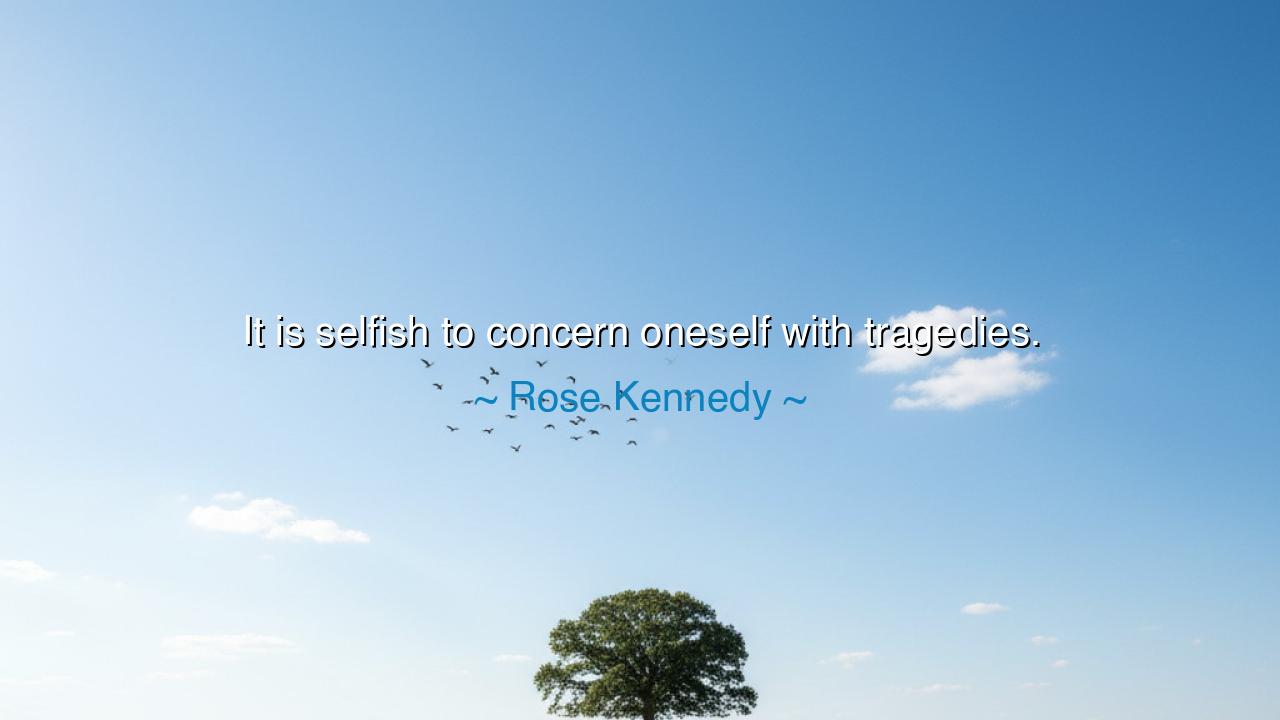
It is selfish to concern oneself with tragedies.






The words of Rose Kennedy, “It is selfish to concern oneself with tragedies,” sound at first as if they would dismiss sorrow, yet upon deeper reflection, they shine as a torch of endurance. She was a woman who bore many griefs—the mother of John F. Kennedy, assassinated; Robert F. Kennedy, assassinated; Joseph Kennedy Jr., lost in war; and Rosemary, confined by illness. Yet from this crucible of loss, she drew forth wisdom that few souls can utter with authority: that one must not be consumed by sorrow, lest sorrow devour life itself. Her words are not a rejection of mourning, but a reminder that grief, when indulged without limit, becomes a form of selfishness, turning one’s gaze inward and away from the living, the future, and the duty still before us.
The ancients often spoke of fate as a river: one may not halt its flow, but one may learn how to steer through its waters. To concern oneself endlessly with tragedy is to cling to the rocks on the river’s banks, refusing to move forward. The wise recognize that tragedy is the common lot of humanity. Heroes fall, kingdoms perish, families are torn, yet life demands that we rise again. In this light, Rose Kennedy’s words remind us that clinging to despair is not noble endurance but rather the refusal to carry onward the responsibilities and love we owe to those still alive.
Consider the story of the Roman general Marcus Furius Camillus, who, after exile from Rome and bitter disgrace, returned not to sulk in sorrow but to rescue his city when it was besieged by the Gauls. Had he drowned himself in bitterness, Rome may have perished. But by setting aside his personal tragedy, he became the very instrument of Rome’s survival. Thus we see how turning from grief toward action transforms the fate not only of the sufferer, but of nations.
The heart may object: “But is it not human to grieve?” Indeed, it is. Grief is natural, and Rose Kennedy herself knew the weight of tears. Yet the teaching lies not in the denial of grief, but in refusing to make grief a throne upon which one sits forever. There is a time to mourn, but also a time to rise. To cling too long to pain is to make sorrow the master, and to abandon those who look to us for strength. To be endlessly wrapped in tragedy is to gaze only at the wound, ignoring the fields that yet must be tilled.
Let us take an example from her own life. When her son Joseph Kennedy Jr. died in World War II, she did not allow the flame of her family to be extinguished. Instead, she turned her energy to supporting her surviving children, who would go on to play towering roles in American history. Out of ashes, she cultivated fire. Had she sunk into despair, had she declared the world unjust and withdrawn from it, the history of a nation would have been impoverished. Her words are thus not cold philosophy, but the hard-forged wisdom of one who lived what she taught.
The lesson is clear: to concern oneself with tragedies without measure is to abandon the living for the dead. To dwell excessively on loss is to forget that each sunrise is an unspent gift. We cannot change what has been taken from us, but we can honor the lost by the deeds we perform with the time still in our hands. The ancients would say: “The gods envy action, not lamentation.”
Therefore, dear listener, take this as a teaching for your own path. When grief comes—and it will, as surely as winter follows autumn—allow yourself the river of tears. But when the season has passed, rise again, dry your eyes, and set your heart toward those who yet depend on your light. Seek purpose in service, in love, in work that uplifts. Speak to the living, build what endures, and let your hands be instruments of healing.
Practical action is the final gift of this teaching: When sorrow strikes, grant yourself the space to feel, but also give yourself a boundary. Name the day when you will rise. Write in your journal not only of what you lost, but also of what you yet may give. Tend to those who suffer near you, for by easing another’s pain, you will find your own heart strengthened. And when despair tempts you to fold inward, remember Rose Kennedy’s words, and know that to live courageously beyond tragedy is not selfishness, but the highest gift you can offer to those who remain.






AAdministratorAdministrator
Welcome, honored guests. Please leave a comment, we will respond soon